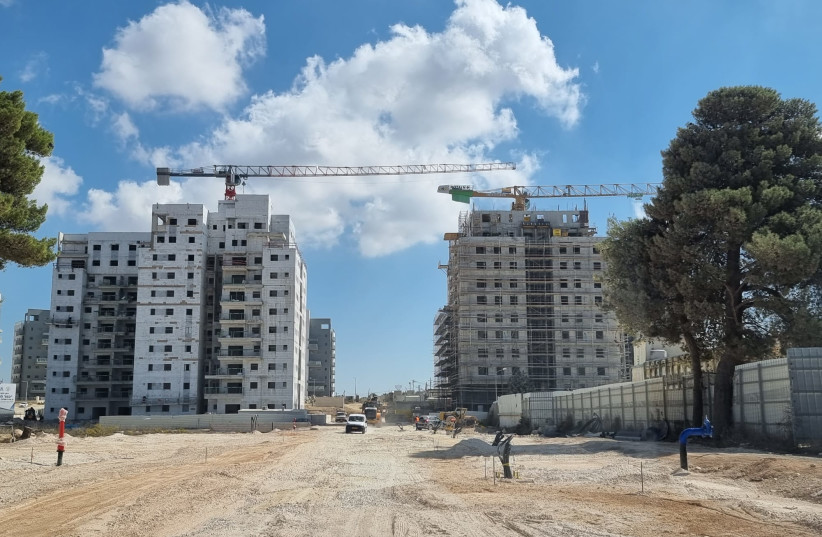It was just two weeks ago that Foreign Minister Yair Lapid and US Secretary of State Antony Blinken were all smiles together in Washington, praising the alliance between their countries and the many ways they are working together.
Before that, Biden and Bennett made sure to give the impression at the end of their meeting at the White House in August that it marked the beginning of a beautiful friendship.
But now it seems that the honeymoon is over.
The inevitable collision between Bennett’s and Biden’s views started to surface in recent days.
It started with murmurs last week that the Biden administration was pressuring Bennett to freeze settlement construction, which some of his cabinet ministers and aides firmly denied, while admitting that Washington is opposed to any building over the Green Line.

Then there was the designation of six Palestinian NGOs as terrorist organizations over the weekend, of which State Department Spokesman Ned Price said the US was not informed in advance.
“We believe respect for human rights, fundamental freedoms, and a strong civil society are critically important for responsible and responsive governance,” Price said, implying Israel does not share that belief.
The fact is, Israel spoke with officials in the US and Europe about the organizations acting as fronts for the Popular Front for the Liberation of Palestine terrorist group multiple times in recent months – and some of the Europeans admitted as much in their reactions to the latest news, even if they disagreed with Israel’s actions.
On Thursday, the day before the ban was made public, Foreign Ministry Deputy Director-General for Strategic Affairs Joshua Zarka spoke with a State Department official, likely Acting Coordinator for Counterterrorism John T. Godfrey. The State Department’s Bureau of Counterterrorism has been downgraded under the Biden administration, and the message may not have gotten to the highest levels at first. However, one would expect that after Israel made the terrorist designations public and disputed the State Department’s version of events, the latter would have looked into what happened.
Instead, Price doubled down on the falsehood that Israel did not update the Americans, four days after he said it – plenty of time to find out what really happened. That sends a message.
Price also said on Tuesday that the US is “deeply concerned” about the government’s plan to build over 3,000 homes for Israelis living in Judea and Samaria, saying it is “completely inconsistent with efforts to lower tensions and ensure calm, and it damages the prospects for a two-state solution.”
On the same day, US Chargé d’Affaires Michael Ratney once again expressed the Biden administration’s strong opposition to settlement construction with Bennett’s Diplomatic Adviser Shimrit Meir.
IT SHOULD come as a surprise to absolutely no one that Biden is putting his foot down over settlements. The fact that Bennett’s team is explaining the “context” of the construction – meaning that they don’t plan to annex or build like crazy, but they also don’t believe in a freeze – is not going to impress someone who has over 40 years of vocal opposition to settlements behind him.
It was a young Joe Biden, threatening aid to Israel over settlement construction, who was the target of former prime minister Menachem Begin’s famous “I am not a Jew with trembling knees” remark.
And lurking in the background is the matter of the Jerusalem consulate to the Palestinians, which the Biden administration wants to reopen and the relevant parties in the current government strongly oppose. Officials in Jerusalem say there is not much pressure from Washington on the matter. But there is a pervasive sense among those involved that the Americans may become more vocal on the matter after the budget vote – only a week away – even if there wasn’t an actual agreement between the sides on timing.
Bennett has tried to get the Biden administration on board with an “agree to disagree” approach on settlements and on Jerusalem. In his own comments in briefings, as well as those of his aides, they say that they explain that there is a political deadlock in such a diverse coalition and he cannot take controversial steps, so settlement construction is only continuing in moderation, and there will not be a consulate to the Palestinians on Israeli sovereign land.
The problem with that approach is that the political camp that the diverse coalition is holding back from building even more in the settlements is Bennett’s own. It may not be as simple as Bennett himself deciding whether there will be a settlement freeze or not, but it’s pretty close to that, and the Biden administration knows it.
Especially after the budget passes next week – if it passes – the shaky coalition will look like even more of an excuse. What’s really going on is that Bennett’s opposition to freezing building in Judea and Samaria and opening the consulate for the Palestinians is ideological, plus his only hope at getting votes in the next election is to appeal to the moderate Right, which won’t stand for either of those things.
A clash between Bennett and Biden is inevitable, because they disagree with each other on matters of principle. The question is what amount of pressure will the Biden administration apply to those disagreements, and this week it seems that it is ramping up the pressure.
